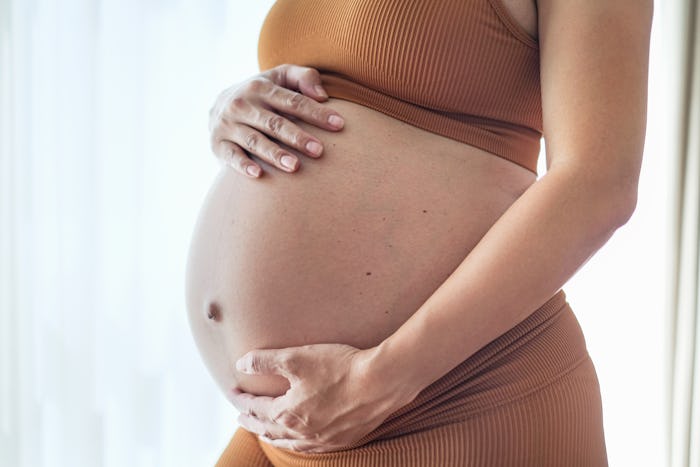So Cool

Can Being Pregnant Change Your DNA?
What really happens is even cooler.
Pregnancy changes so much about your body, from your hairline to what you dream about each night. When it comes to who you are as a person, motherhood is definitely going to make some changes there, too. But can being pregnant change your DNA — as in the blueprint in your literal cells? You may have heard this little fun fact floating around before — that being pregnant changes your fundamental biology — but it’s not exactly true, according to experts.
Can being pregnant change your DNA?
In short, no. Your genome — your unique genetic information we all know as DNA — isn’t going to change when you get pregnant.
“I think it’s a huge overstatement to say that one’s genome is altered forever after having a baby,” says Dr. Jeffrey Kuller, M.D., a maternal-fetal medicine specialist at Duke Health. “After delivery, there’s a small amount of fetal DNA that remains in the mother’s circulation that may have some immunologic effects long-term, maybe decreasing risk of preeclampsia, maybe having some modulation of autoimmune diseases. But I think largely [it’s] not all that well understood and certainly not changing one’s overall DNA pattern.”
So if being pregnant doesn’t change your actual DNA, where’d this idea come from? It may have sprouted, Kuller theorizes, from that knowledge that your baby’s DNA actually circulates in your bloodstream while you’re pregnant (it’s called cell-free DNA). This DNA is what’s tested, when they take your blood for prenatal screenings, to assess your baby’s risk of having conditions like trisomy 18 or Down syndrome.
A “large proportion” of pregnant patients receive this screening, Kuller says, which may be why some people become curious or confused about the relationship between pregnancy and DNA. The idea that pregnancy can somehow change your DNA has spread on social media, especially in miscarriage and infant loss communities, and rightfully so. The notion that your child has altered you permanently and will always be with you on a biological level is pretty profound. While pregnancy may not alter your actual genome, some researchers believe fetal DNA lingers in the mother’s body for years after her child is born. For all parents, including those who have miscarried or experienced loss, that means some part of your baby could very well still be part of you.
Does your child’s DNA stay behind after you give birth?
It actually does. It’s called fetal microchimerism (FMc) — when low amounts of fetal cells linger in a mother’s body during and after pregnancy, presumably so Mom’s immune system recognizes the fetus as part of her, and not an outside organism to attack. Researchers have found FMc cells in women’s blood, brains, skin, heart, lungs, lymph nodes, and other organs. Other studies concluded that fetal DNA circulates in mothers’ bodies for up to 27 years after the birth of her baby. Scientists are still learning what these fetal remnants do in that time, but some have found evidence that FMc can benefit a mother’s health, helping regenerate tissues and replace cells.
“Perhaps there is this small microchimerism effect that there is maybe a little bit of DNA left behind after a delivery, which isn’t so crazy, and maybe in some years we’ll find that it does have some effect on all kinds of immunology and biology that we don’t understand now,” Kuller says. “But I think that basic premise of is one’s DNA changed forever after a delivery seems like a big overstatement to me.”
Research into microchimerism isn’t far along enough for Kuller to use the concept to comfort his own patients. But he also said it hasn’t been proven false. “This I don't think is far-fetched. My takeaway is that there may be something to this. I just feel like we need further evidence, and I think we really don’t know what it means long term,” he says.
But if you take comfort in the idea that your baby is still part of you long after they leave your body — maybe even healing you on some cellular level — don’t stop believing.
Studies referenced:
Cómitre-Mariano, B., Martínez-García, M., García-Gálvez, B., Paternina-Die, M., Desco, M., Carmona, S., & Gómez-Gaviro, M. V. (2022, January). Feto-maternal microchimerism: Memories from pregnancy. IScience, 25(1), 103664. https://doi.org/10.1016/j.isci.2021.103664
O’Donoghue, K. (2008, December). Fetal microchimerism and maternal health during and after pregnancy. Obstetric Medicine, 1(2), 56–64. https://doi.org/10.1258/om.2008.080008
Expert:
Dr. Jeffrey Kuller, M.D., a maternal-fetal medicine specialist at Duke Health
This article was originally published on